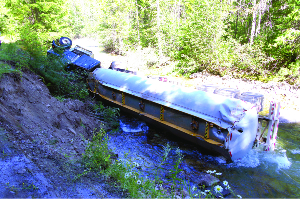
In 2013 a jet fuel truck operated by Executive Flight Centre, and servicing BC Ministry of Forests firefighting efforts, plunged off a road in the Slocan Valley, crashing into the pristine Lemon Creek and dumping 33,000 litres into the river, compromising drinking water and killing fish. The province investigated, concluding that no charges were warranted. The case would have been closed, but for the efforts of Marilyn Burgoon, a resident of the Slocan Valley, with a little help from our Environmental Dispute Resolution Fund. When the province wouldn’t act, Marilyn laid her own charges – a course of action that led directly to a federal government appointed prosecutor laying new charges last Friday (July 22nd) against both Executive Flight Centre and the BC Government.
As the Nelson Star reports:
The federal government has decided to lay eight charges against Executive Flight Centre stemming from the fuel spill in 2013 when the company’s tanker truck overturned into Lemon Creek in the Slocan Valley, spilling 33,000 litres of fuel. Also named as defendants are the provincial government and the driver of the fuel truck, Danny LaSante.
Court documents filed last week show two counts of “depositing a deleterious substance in a water frequented by fish” under the FisheriesAct. The penalty on conviction is a minimum of $5,000 for an individual and $100,000 for the government or a company.
There are also six counts of “introducing waste into a stream causing pollution” under the EnvironmentalManagementAct. The maximum penalty set out in the Act is a $1-million fine or six months in jail.
West Coast is proud to have played an important role in getting charges laid and the potential for justice for Lemon Creek. When Marilyn first contacted us about the province’s failure to lay charges, we put her in touch with the lawyers who became her legal team - Lilina Lysenko and Jeff Jones (the latter having handled private prosecutions for Alexandra Morton). We also provided some of the funding that allowed her to lay charges under the Fisheries Act against Executive Flight Centre and the government. Marilyn was able to convince a BC provincial court judge to issue the charges and order the defendants to respond.
Thousands of British Columbians also wrote to the federal government urging them to take over the case and lay charges. It now appears that those voices were heard!
The broader context
We shouldn’t be all celebration – however. The Lemon Creek charges raise fundamental questions about why Marilyn had to work so hard to get charges laid in a dramatic and high profile spill. Although the charges are yet more evidence that private prosecutions can be an important environmental law tool – in an ideal world the government, not private citizens, should be laying charges.
In actual fact we’ve seen drops in environmental charges being laid at both the federal and provincial (BC) levels, and the Lemon Creek example suggests that this is because governments are failing to lay charges – rather than that there’s no serious environmental harm occurring. Cuts to field staff, changes to the law and perhaps ideological motivations all play a role in this chronic non-enforcement of our environmental laws.
We should all press our governments to reverse these troubling trends, but in the meantime citizens will increasingly consider turning to private prosecutions when the government doesn’t step up to the plate. At least one person retweeted our tweet about the Lemon Creek charges, adding a #MountPolley hashtag - a reference to the fact that charges have yet to be laid in relation of the Mount Polley mine disaster.
Marilyn and her lawyers have shown us that a determined individual acting on behalf of her community can get some environmental justice. Congratulations once again, Marilyn.
By Andrew Gage, Staff Counsel